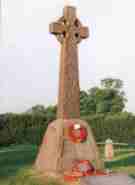
|
Arborfield
|
|
Memories
Related sites:
Poperinghe Barracks from the air in 1946
|
On June 9th 1939, the 'Times and Weekly News' reported on the Wokingham Rural District Council meeting the previous Tuesday: ‘Main Water Extension at Arborfield’ 'The report of the Public Health Committee disclosed that with regard to the Main Extension for the War Department at Arborfield, the Chief Engineer of the Aldershot Command had again emphasised the extreme urgency of this matter and has pointed out that the War Department is prepared to accept the general terms and conditions of the draft agreement, subject to minor alterations and additions, including the provision for payment by the War Department of a contribution of £900 towards the cost of the new main.' This urgent request was to prepare the camp for an imminent influx of Militia men on top of the Army Technical School and the Ordnance Depot. On June 23rd, the newspaper added: ‘Arborfield Training Camps’ The work at Arborfield is going on at full speed and, when completed, it is estimated that 2,500 men will be training at the Military Camps in addition to the 500 men who are now in training at the Military School there.
The 'Times and Weekly News' on Friday 21st July described the arrival of the Militia at Arborfield as follows: Militia at Arborfield Marquees and Bell Tents Thirty thousand men end their civilian life for six months and begin their training under the recent statute, an event of vital consequence to the peace of the world and the safety of the Empire in face of the gravest menace since 1914. But militia service is no mere improvised expedient to meet a modern danger; it is the oldest and most democratic form of national military training in British history. […] At Arborfield, the camps are fast being completed and, when this is so, will comprise sports grounds, swimming pools, Recreation huts and a cinema, but this is not yet. At the moment, huge marquees are erected, and a large number of bell tents. Kitchens and shower baths are already provided. The influx commenced on Saturday and, as the young men reached Wokingham, Regular Army officers of the Royal Artillery were waiting to greet them. This continued on Sunday and Monday and the Militiamen soon settled down to the exigencies of camp life. On Monday as the Recruits left the trains at Wokingham, buses of the Thames Valley Traction Company conveyed them to Arborfield and, whilst waiting, they shewed [sic] themselves to be a happy, care-free party eager for the business before them. […] The 'Reading Mercury' the next day carried a couple of photos of: ‘Militiamen arriving at the camp at Arborfield to undergo their training’
and ‘Instruction in Drill for Militiamen at Arborfield’:
[Copyright 'Mercury' photos; used by permission].
This was followed-up on August 5th with an article and photographs: War Minister at Arborfield Chats With the Militiamen Complaints about ‘Bus Fares to Reading’ Regular soldiers and veteran reservists gulped and stared with horror at
Militiaman Jones, North-country miner, as he walked purposefully towards the
Minister for War and the Commanding Officer of the 6th Anti-Aircraft
Militia Depot, Arborfield,
"Just a moment", called Mr. Hore-Belisha. The regulars and the reservist instructors looked at each other knowingly and waited for an outburst. Instead, the War Minister started to chat with Jones. He asked him what he thought about the Army, what he thought about conscription, and if he thought the picture would come out all right. Jones answered in just the same conversational tone. Then he walked away, and Mr. Hore-Belisha said: "There we see our new soldier. He’s not scared of us and he knows what he wants". No special arrangements were made for the visit of the War Minister. Routine work was being carried out as he was greeted at the entrance to the depot by Lieut.-Col. C. M. Christie, M.C., Officer Commanding. In company with the adjutant, Capt. E. D. Garnett, Capt. G. R. Moxon, adjutant, and Capt. D. Gordon, M.C., officer in charge of administration, they made a thorough inspection of all that was going on. The first stop was made near the guns, where Bombardier Colloff was instructing a squad in fuse-setting. Mr. Hore-Belisha chatted with Mr. Colloff, who has given up a profitable job as a seller of pin tables to come back into the Reserve and teach Militiamen. "How are the young men knuckling down?" asked Mr. Hore-Belisha. "They are doing very well indeed under the conditions", said the bombardier. "The fact that they are learning fuse-setting after only two weeks in the Militia prove that". "How do you like being in the Reserve again?" Mr. Hore-Belisha asked. "Well, I’m losing money by it", replied Colloff, "but it isn’t a question of liking or disliking it. I’ve got a job to do here and I’m going to see that it’s done properly". Putting on Weight
Mr. Hore-Belisha passed on to the range-finding squad, and he watched young men of all shapes and sizes learning how to march and how to salute to numbers. Then he saw one of the two smallest men in the camp, Militiaman N. V. Jackson, who is an electrician in private life. He is so small that great difficulty was found in fitting him with a uniform. The Army has not yet found a hat that will fit him, so he goes about bare-headed The other tiny man is W. D. Hayes, of Malpas, who is very annoyed to find that Army life and food are causing him to put on weight fast. The reason for his annoyance is that he is a jockey!
There was a big shout of "No", but one young man said they were all grumbling about the ‘bus fare to Reading. "They charge us 1s. 6d. return, sir", he said. "It’s only six miles, and YOU know how much money we get a week". The cue was taken by a dozen others. "We can’t see the full show at the pictures because the ‘buses don’t run late enough", one shouted. Another one declared that the ‘bus fares meant that they were practically confined to camp. "There’s nowhere to go from here except Reading, and we can’t afford it", said a third. "Well, I can’t promise you a rise", said Mr. Hore-Belisha, and the trouble was momentarily forgotten with everyone laughing. Camp Coaches Scheme? The question of ‘bus charges has been occupying the mind of the Commanding Officer, and he told a representative of this paper that it had not been possible to get the ‘bus company to agree to a reduction. He said there was a scheme on foot for the camp to charter coaches on their own and run the men into Reading at regular times at a fare considerably lower than 1s. 6d. Mr. Hore-Belisha spoke to a number of married men in the Militia, and he remarked that the married men seemed to be even happier than the single ones. "But it wouldn’t do for me to express an opinion on that, would it?" he said amid laughter. Militiaman Edgar Gibbs, of Newport, then asked Mr. Hore-Belisha to stand quite still while he took a photograph of him. Mr. Hore-Belisha did stand quite still for several minutes while other men produced their cameras. Militiaman Jones, to whom reference has already been made, couldn’t find his camera until the War Minister had gone to quite another part of the camp, but he did not let that stop him getting his picture as well. Before leaving, the War Minister inspected the camp itself and the equipment, and he saw dinner being served up. He had previously made a tour of the adjacent camp housing the Anti-Aircraft Unit. He was accompanied there by Major-General C. N. F. Broad, C.B., D.S.O., Major-General in charge of Administration, Aldershot Command. Others with him were: Brigadier R. B. Pargiter, Commander, 1st Anti-Aircraft Brigade; Lieut.-Col. R. C. Reynolds, M.C., Officer Commanding troops, Arborfield; Major R. C. G. Foster, Garrison Adjutant, Arborfield; Lieut. L. P. S. Bacon, Adjutant, 5th Anti-Aircraft Militia Depot, and Major C. E. Barrington, M.C., officer in charge of Administration. [Copyright 'Mercury' photos; used by permission].
The following week, the Mercury reported: Complaints at Arborfield Camp Reservists meet Colonel Following grievances received about the conditions of service made by reservists called up for instructional purposes at the Arborfield Militia Camp, Lieut.-Colonel C. M. Christie, of the 6th Anti-Aircraft Militia, yesterday (Friday) called all the reservists together and asked them to tell him their troubles. The main grievance appeared to be the fact that other arms of the service were receiving a £5 bounty whilst the Army reservists were only receiving £1. A number of cases of considerable hardship were described to the colonel, who promised to pass them on to a higher authority of the Aldershot Command. Another grievance of the men is that they had to come up for service in their civilian clothes, which were now spoiled as a result of the recent rainy weather. Colonel Christie informed the men that their grievances would be tabulated and forwarded to a higher authority. He told a Press representative on Friday: "I think the men have real grievances in these matters, and I hope they will be sympathetically treated by the powers-that-be. The men have no grievance against this camp in itself; in fact, they are a very happy lot of men, and very well behaved. I must have had 120 reservists here so far, and not one of them has had to be brought before me even for a minor military offence". With acknowledgements to: Surrey & Berkshire Media ('Times and Weekly News and
'Reading Standard'); Back to 'Newspapers in Wartime' Main Page
|
||
|
Any Feedback or comments on this website? Please e-mail the webmaster |
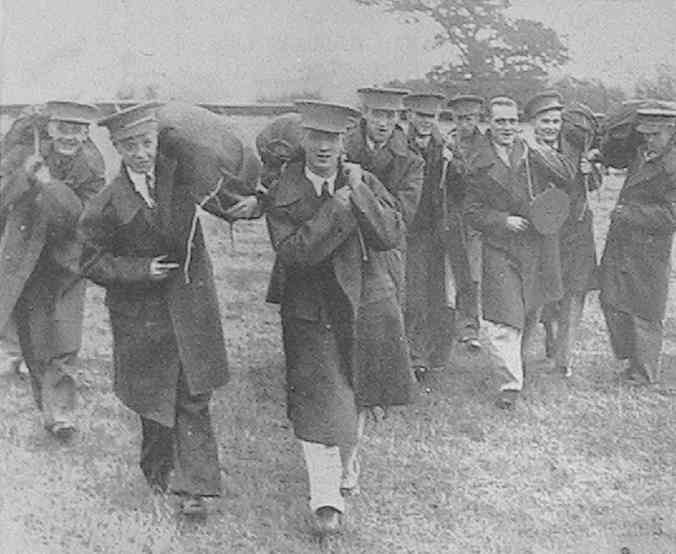
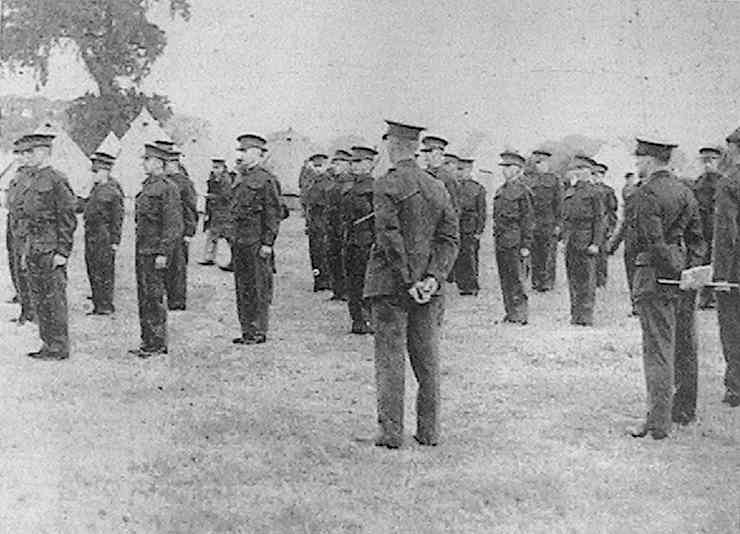
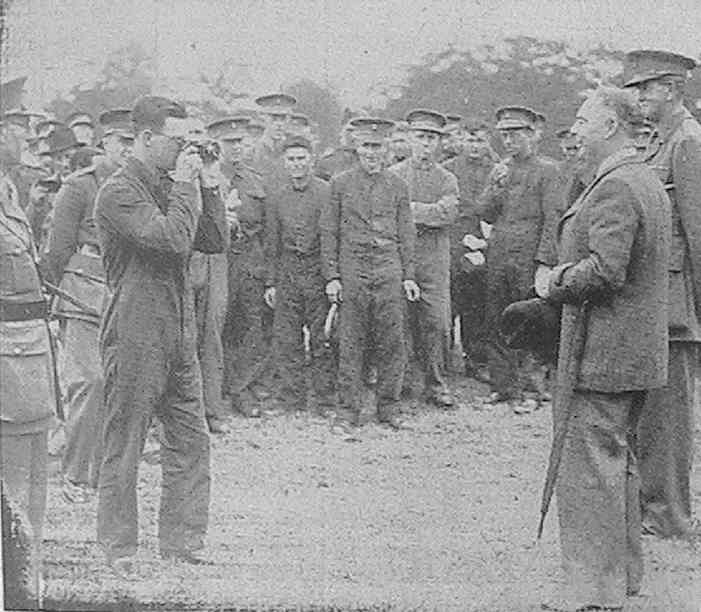 as
they were engaged in earnest conversation on Saturday. Jones had a cheap box
camera in his hand, and, without emotion, he asked the two distinguished
gentlemen to pose. They posed, he took his photograph, thanked them and started
to walk away.
as
they were engaged in earnest conversation on Saturday. Jones had a cheap box
camera in his hand, and, without emotion, he asked the two distinguished
gentlemen to pose. They posed, he took his photograph, thanked them and started
to walk away.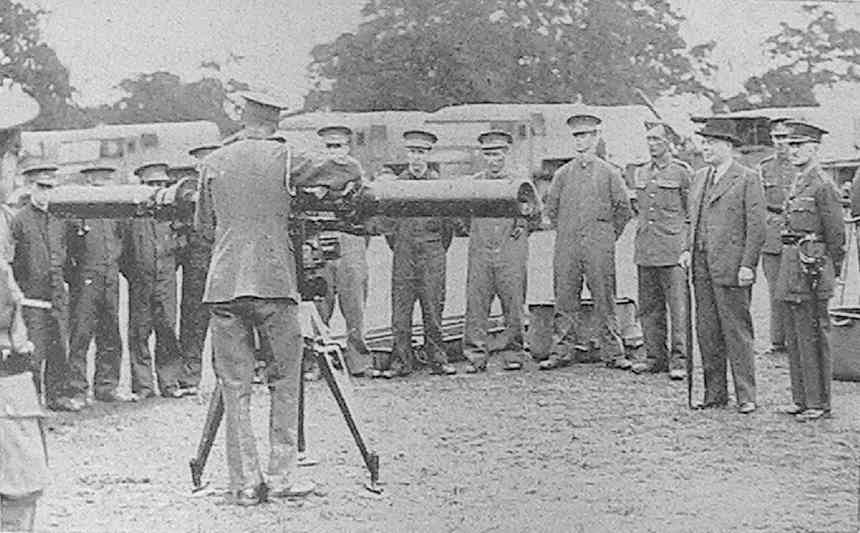
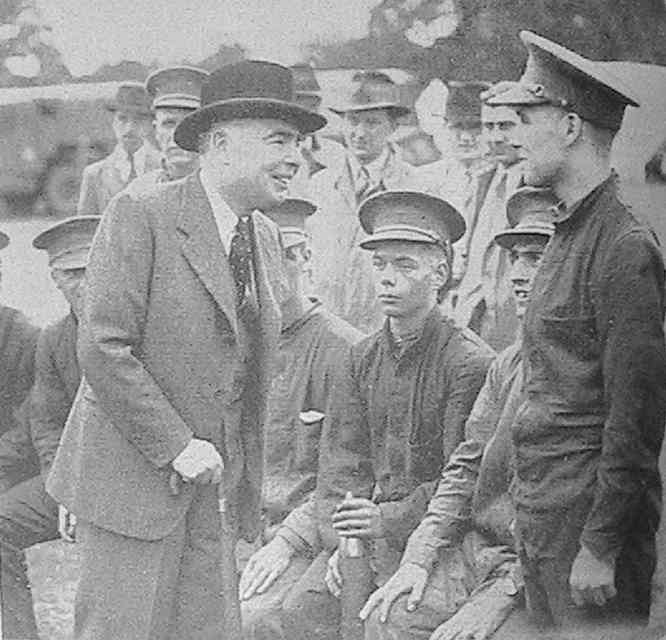 After
watching nearly 200 men taking part in massed physical training, Mr.
Hore-Belisha suddenly found himself surrounded by Militiamen who had been
dismissed from duty prior to the mid-day meal. He took the opportunity to have a
heart-to-heart chat with them. "Have you any complaints about the food?" he
asked.
After
watching nearly 200 men taking part in massed physical training, Mr.
Hore-Belisha suddenly found himself surrounded by Militiamen who had been
dismissed from duty prior to the mid-day meal. He took the opportunity to have a
heart-to-heart chat with them. "Have you any complaints about the food?" he
asked.